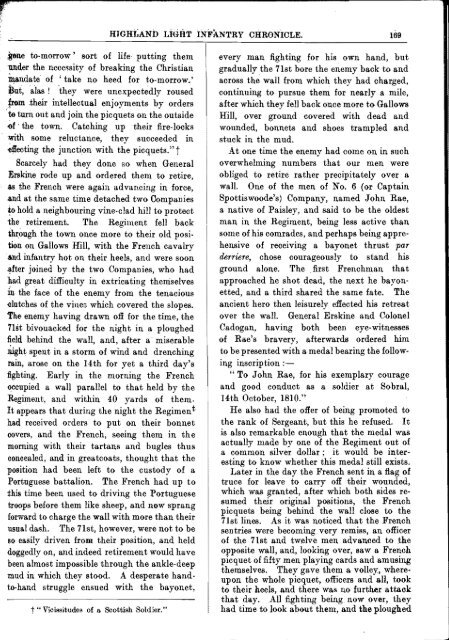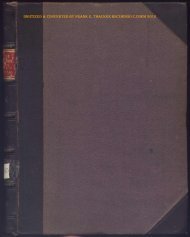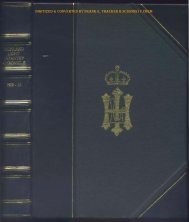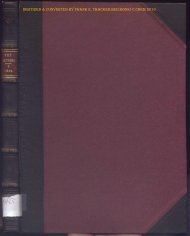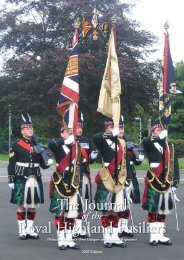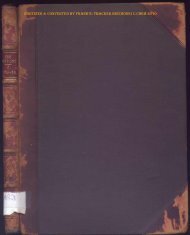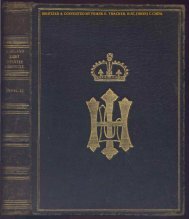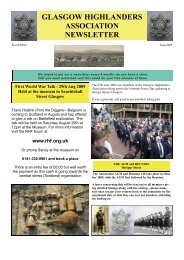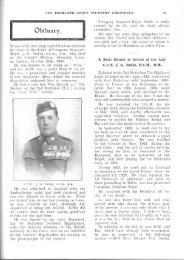HLI Chronicle 1910 - The Royal Highland Fusiliers
HLI Chronicle 1910 - The Royal Highland Fusiliers
HLI Chronicle 1910 - The Royal Highland Fusiliers
- No tags were found...
Create successful ePaper yourself
Turn your PDF publications into a flip-book with our unique Google optimized e-Paper software.
HIGHLAND LiGHT INFANTRY CIIRONICLE.<br />
,g&ne to-morrow' sort of life putting them<br />
-under the necessity of breaking the Christian<br />
~ndate of 'take no heed for to-morrow.'<br />
But, alas! -they were unexpectedly roused<br />
Jrom .their intellectual enjoyments by orders<br />
'to turn out and join the picquets on the outside<br />
-Gf 'the town, Catching up their fire-locks<br />
with some reluctance, they succeeded in<br />
~lIecting the junction with the picquets." t<br />
Scarcely had they done so when General<br />
El'8kine rode up and ordered them to retire,<br />
-is the French were again advancing in force,<br />
and at the same time detached two Companies<br />
~ hold a neighbouring vine-clad hill to protect<br />
the retirement. <strong>The</strong> Regiment fell back<br />
.through the town once more to their old position<br />
on Gallows Hill, with the French cavalry<br />
.and infantry hot on their heels, and were soon<br />
.~fter joined by the two Companies, who had<br />
bad great difficulty in extricating themselves<br />
In the face of the enemy from the tenacious<br />
-olntches of the vinea which covered the slopes.<br />
<strong>The</strong> enemy having drawn off for the time, the<br />
7llit bivouacked for the night in a ploughed<br />
field behind the wall, and, after a' miserable<br />
liight spent in a storm of wind and drenching<br />
rain, arose on the 14th for yet a third day's<br />
lighting. Early in the morning the French<br />
oocupied a wall parallel to that held by the<br />
Regiment, and within 40 yards of them.<br />
It appears that during the night the Regiment<br />
had received orders to put on their bonnet<br />
covers, and the French, seeing them in the<br />
morning with their tartans and bugles thus<br />
concealed, and in greatcoats, thought that the<br />
position had been left to the custody of a<br />
Portuguese battalion. <strong>The</strong> French had up to<br />
this time been used to driving the Portuguese<br />
troops before them like sheep, and now sprang<br />
forward to charge the wall with m()re than their<br />
usual dash. <strong>The</strong> 7lst, however, were not to be<br />
80 easily driven from their position, and held<br />
doggedly on, and indeed retirement would have<br />
been almost impossible through the ankle-deep<br />
mud in which they stood. A desperate handto-hand<br />
struggle ensued with the bayonet,<br />
t "Vioissitudes of a Scottish Soldier."<br />
every man fighting for his own hand, but<br />
gradually the 7lst bore the enemy back to and<br />
across the wall from which they had charged,<br />
continuing to pursue them for nearly a mile,<br />
after which they fell back once more t() Gall()ws<br />
Hill, over ground c()vered with dead and<br />
wounded, bonnets and shoes trampled and<br />
stuck in the mud.<br />
At one time the enemy had come on in such<br />
overwhelming numbers that our men were<br />
obliged to retire rather precipitately over a<br />
wall. One of the men of No. 6 (or Captain<br />
Spottiswoode's) Company, named John Rae,<br />
a native of Paisley, and said to be the oldest<br />
man in the Regiment, being less active than<br />
some of his comrades, and perhaps being apprehensive<br />
of receiving a bayonet thrust par<br />
derriere, chose courageously to stand his<br />
ground alone. <strong>The</strong>. first Frenchman that<br />
approached he shot dead, the next he bayonetted,<br />
and a third shared the same fate. <strong>The</strong><br />
ancient hero then leisurely effected his retreat<br />
over the wall. General Erskine and Colonel<br />
Cadogan, having both been eye-witnesses<br />
of Rae's bravery, afterwards ordered him<br />
to be presented with a medal bearing the following<br />
inscription<br />
" To John Rae, for his exemplary courage<br />
and good conduct as a soldier at Sobral,<br />
14th October, 1810."<br />
He also had the offer of being promoted to<br />
the rank of Sergeant, but this he refused. It<br />
is also remarkable enough that the medal was<br />
actually made by one of the Regiment out of<br />
a common silver dollar; it would be interesting<br />
to know whether this medal still exists.<br />
Later in the day the French sent in a flag of<br />
truce for leave to carry off their wounded,<br />
which was granted, after whieh both sides resumed<br />
their original positions, the French<br />
picquets being behind the wall close to the<br />
7lst lines. As it was noticed that the French<br />
sentries were becoming very remiss, an officer<br />
of the 7lst and twelve men advanced to the<br />
opposite wall, and, looking over, saw a French<br />
picquet of fifty men pia' cards and amusing<br />
themselves. <strong>The</strong>y gave m a volley, whereupon<br />
the whole picquet, officers and all, took<br />
to their heels, and there was no furthex attack<br />
that day. All fighting being now over, they<br />
had time to look about them, and the ploughed


